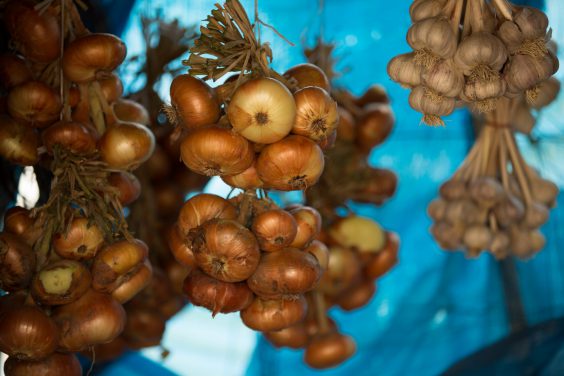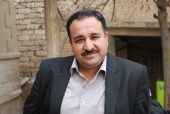An Excerpt from Fairuz by Nawzat Shamdin
by Nawzat Shamdin translated by Amani Attia / October 31, 2016 / No comments

Image via: Public Domain Pictures.
Even after he had bought my onions he was constantly watching me. The sale was a flimsy excuse to get close. Then, he would disappear, off the roads, off the fields, leaving no tracks, not even a shadow behind the two rocks where he lingered, watching me for hours on end, motionless. I felt his presence. I felt it in my soul, even before his frail body made it palpable with his joyful materialization. And I would continue to be connected to him, as he quietly disappeared again like the setting sun.
In the early days of his appearance in my life he seemed more like a lurking wolf, waiting for an unheeding prey to make a leap. He would sit like a statue at a distance, disappear, and then reappear as a ghost in a different spot. And even when he kept his distance from me, it was never far enough to put my mind at ease. I continued to feel apprehensive, especially with Aunt Nadeema’s horrifying stories about frequent attacks on Yazidi women after the complete deterioration of the security situation in the country. Women, just like me, who had no connections to protect them. After dinner and having made certain my sisters were asleep, my aunt would recount stories she had heard from men in our village. She would reenact them as well, moving swiftly around the room holding a knife or a broom as a prop for a gun, and always ending her story with a phrase she had learned by heart: “The honor of Yazidi women is dearer to them than life itself.”

- Nawzat Shamdin is a prominent Iraqi Kurdish journalist, novelist, and literary critic. Throughout his journalistic career, he has worked for publications such as Ninevah Daily, the dailies Wadi Al-Rafidayn, the Mustakbal al Iraqi, and the Bagdad-based daily Al Mada. He has served as the editor-in-chief for the cultural journal Thaqafat since 2010. His novel Half A Moon was published in Arabic in 2002. He is a member of the Iraqi Union of Writers, the International Press Union and the Iraqi Journalist Association. He also has a law degree and is a member of the Iraqi Bar Association. Since 2004 Nawzat has been threatened by opposition groups linked to al-Qaida and coalition forces. He has been living in exile in Skien, Norway since 2014.
I always remembered how amusing he looked when I saw him approaching me for the first time, taking small steps in my direction, looking down like a chastised little boy. As usual, I was sitting on my little stool with the foam cushion with my merchandise of white onions before me, on the ground. At first I took him to be one of the new lunatics around town, and looked quickly for a suitable stone to prepare myself to defend against any aggression. However, as he squatted on the ground to weigh the onions himself, his well-combed hair, his neat attire, and peaceful mannerisms made him look harmless and I felt at ease. For the next few days I saw him repeatedly on the other side of the street, whether near or far, without attempting once to look in my direction. I did not sense danger and kept the incident to myself, rather than share it with the girls or with Aunt Nadeema. Deep down, I had a strong feeling he came around just to be near me.
I was barely six years old when my mother died of a heart attack, and the responsibility of raising my two sisters Ne’aam and Kuli fell on my shoulders. As my father had disappeared a year and two months prior to my mother’s death in the mazes of distant Mosul, I had to be the main provider for my family. We had inherited nothing besides collecting a number of small debts from those who were kind enough to pay them back to us after our mother’s demise. My sisters and I were as isolated in this world as a branch cut from a tree. We had no family left, except for God and Aunt Nadeema, who was skin and bones from poverty and the demands of caring for a handicapped husband.
I quickly learned to carry on a mother’s responsibilities, having practiced running the house several months before her death. In our extreme poverty, she had become a white onion vendor after our father‘s disappearance. This had left me with the obligation of tending to my two sisters, in addition to baking, cooking three meals daily, doing the laundry, and washing the dishes. There were other responsibilities too: hauling drinking water out of the well, raking dead plants, and removing sheep dung and drying it to create fuel for our brick oven.
Following the week of mourning after my mother’s death, I took her spot as the onion vendor on the tiled road side separating the Yazidi villages from the Arab ones east of the Sinjar mountains. I went every morning at dawn with a number of other women vendors, transported there in the back of one-eyed Nouri’s Chevrolet truck, a ride for which we paid a monthly fee. He also supplied us with our rations of onions from the warehouses in the villages of Rabi’aa or Tel’afar. He dropped us, one next to the other, along the road that led to the Arab villages. We sat there for hours, separated by a few hundred meters from each other, all day, each with a pile of onions on display to passing traffic and pedestrians up and down the road. I was the last to come off the truck in the morning, and the first to get back on it at sundown. Nouri would then return us to the village with our meager profits. On some days, we ended up taking back some of the merchandise that we could not sell and could only hope to have better luck the next time we went to work.
Poverty had prevented me and my sisters from attending the far off school to which a number of lucky girls from our village went. They left every morning, and came back carrying their colorful school bags. I grew up dreaming to be one of those girls, and when my father disappeared, and with him my dream, I transferred my ambition to my sister Kouli, ten years my junior, hoping she would one day join the lucky girls. She was smart, making her own dolls from leftover rags and strands of wool snatched from the pillows. She could memorize whole conversations that she had heard and would repeat them later, mimicking the original speakers and their gestures like a funny little old woman with her two plaits. Kouli added merriment to our little house, unlike our youngest sister Ne’aam, two years younger than Kuli, very thin, quiet, and with a distinctively pale face that always made her seem ill. For many nights after the first weeks following our mother’s death, Ne’aam’s nightmares would make her crawl into my bed to sleep close to me. I would feel her tremble against me and cry, holding my hair in her little hands, rubbing her face against mine, sniffing me for a hint of her mother’s smell and when I woke up with her next to me, my heart would bleed for my failure to become a replacement mother.
One Friday evening, at the beginning of our disastrous summer, I told Aunt Nadeema everything. My secrecy about a strange person following me all hours of the day had become unbearable and made me feel sinful and guilty. I didn’t know when Khouda would punish me for my deed. My aunt kneeled behind me to comb my hair as she used to, the lantern light reflecting our shadows on the wall. I began to speak as she moved the comb to the left side of my head:
“Someone is watching me while I am at work,” I said.
The comb stopped, shadow wavering as she pressed her hand on my right shoulder and cried to the saint:
“Oh my Sheikh Eddie!”
Then she asked me discreetly, “Has he said anything to you? Is he one of the Peshmerga fighters? The military? Or police?”
“He is a young man from the Arab villages. He buys my onions everyday. I never answer when he talks. What would I say when I hardly know any Arabic?”
I heard a thump as she beat her chest in distress.
“He could be a terrorist,” she moaned.
I was stricken by terror for a moment, but quickly I recalled his thin voice and pleasant features. It wasn’t possible that they could belong to an evil man.
“I am not sure how to explain this to you. He is shy, does nothing but buy the onions, then just lingers on the other side of the road.”
She pushed down on my shoulder heavily.
“Buhaar, you are eighteen years old,” she said. “The villagers are always talking of your beauty and your slender figure. You spend all day on the road. You have to be very careful. This world is full of rabid dogs.”
Then she added, “Could it be he is there for one of your friends rather than you?”
The electricity abruptly returned and our shadows disappeared from the wall as the light bulb came back on, revealing Aunt Nadeema’s threadbare furniture, and Ne’aam and Kuli fast asleep in bed. I detached myself gently from her grasp to turn off the lantern. She was still kneeling with comb in hand, waiting for my response.
“They are all married women,” I said. “And he only buys my onions, twice a day!”
My answer agitated her. She stood and lunged to clutch my arm so tightly the lantern shook.
“Do you think all the Yazd women suicides we hear of are for real? Burned women, hung women, women stabbed or shot? They were killed by love, you poor orphan girl, lonely as a tree, without a man to have your back.”
She slapped her right cheek with her free hand as if she had remembered something, and said: “Almighty Khouda! You need to understand well that love between Yazidis and Muslims is forbidden. They will compete over who will have the honor of killing you, to wash away the scandal. Those honor killings have happened only too often in the mountains. They spread stories of suicide only because it is not punishable by law, and they would not be telling truths that would hurt their honor. In reality, the victims are girls or women killed by their fathers, husbands, brothers, even neighbors. It doesn’t matter who carries it out or how gruesome the act. The only thing that matters to them is washing away the scandal, the shame, and burying it with the victim forever.”
She pointed her comb towards my sleeping sisters.
“Think of those two clueless poor girls before you get carried away by your innocence and inexperience and do something crazy.”
She took the smoldering lantern from my hand, raised it to the height of our faces and tapped its hot glass with her thumbnail.
“A girl’s honor is like this glass,” she said. “Anything can break it. Nothing will ever fix it.”
بُهار by SampsoniaWay.org on Scribd




